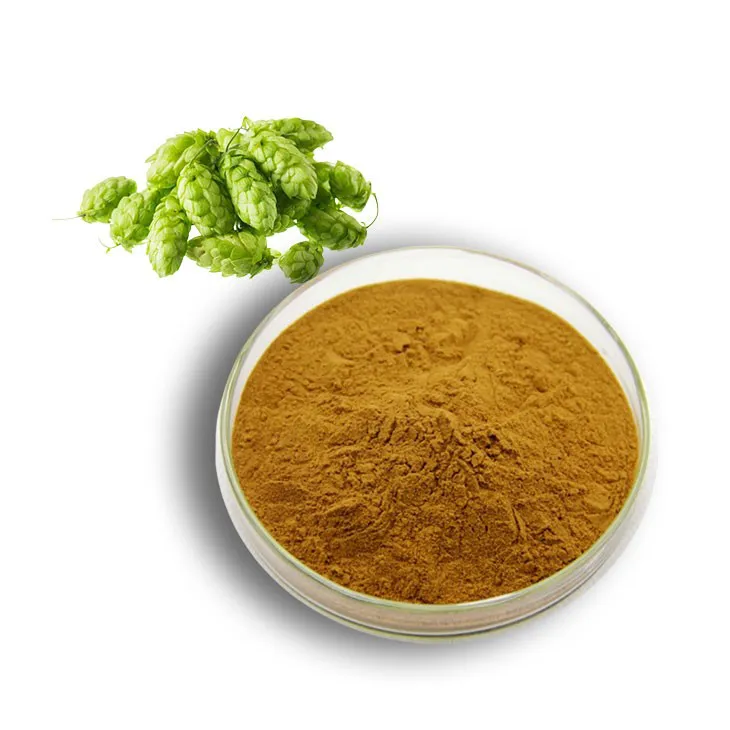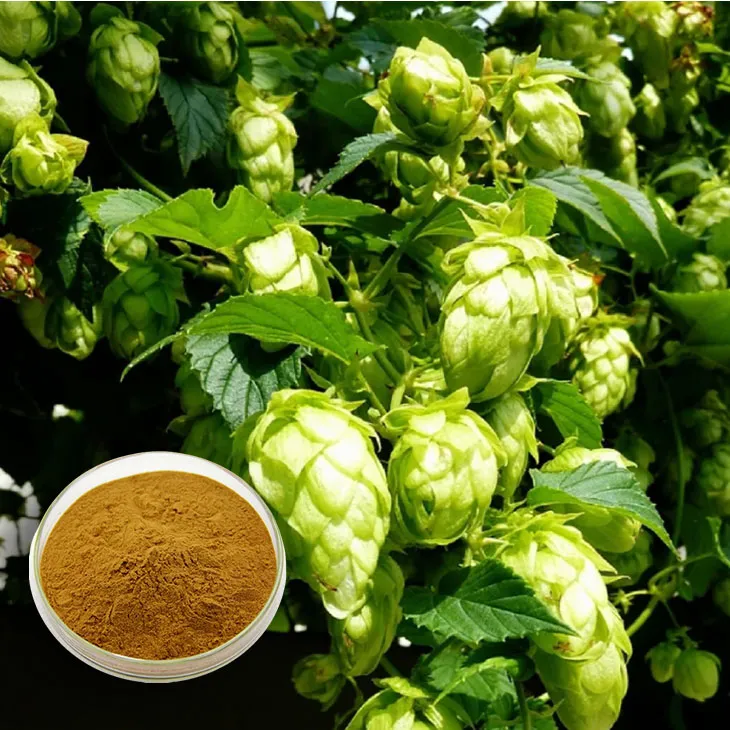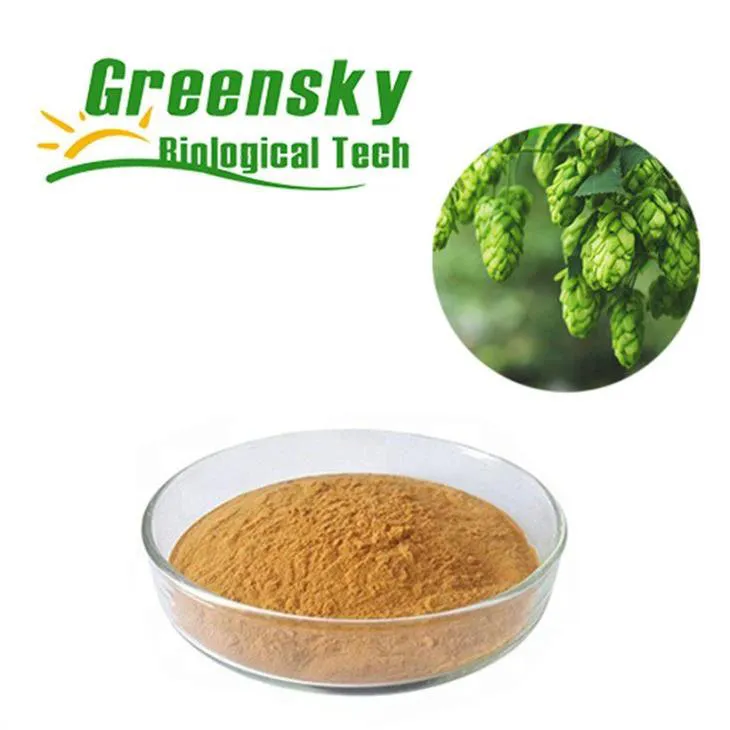- 0086-571-85302990
- sales@greenskybio.com
Use hops extract to prevent diseases and enhance immunity.
2024-11-13

1. Introduction
Hops, a key ingredient in beer production, has been gaining increasing attention not only for its role in brewing but also for its potential health benefits. Hops Extract is being explored for its ability to prevent diseases and enhance the immune system. This article delves into the scientific mechanisms underlying these effects, from modulating immune responses to combating pathogens.

2. What is Hops Extract?
Hops Extract is derived from the female flowers of the hop plant (Humulus lupulus). It contains a variety of bioactive compounds, including flavonoids, phenolic acids, and terpenoids. These compounds are responsible for the characteristic aroma and flavor in beer, but they also possess potential medicinal properties.

3. Modulating Immune Responses
3.1 Innate Immune System
The innate immune system is the body's first line of defense against pathogens. Hops extract has been shown to interact with components of the innate immune system. For example, certain terpenoids in hops extract can stimulate the activity of macrophages, which are immune cells that engulf and destroy foreign invaders. Macrophages play a crucial role in the early detection and elimination of pathogens. By enhancing macrophage activity, hops extract can help the body mount a more effective initial response to infections.
Another aspect of the innate immune system that hops extract may influence is the production of cytokines. Cytokines are small proteins that act as messengers between cells, coordinating the immune response. Some studies suggest that hops extract can regulate the production of cytokines, ensuring a balanced immune reaction. For instance, it may promote the production of anti - inflammatory cytokines in appropriate amounts, which can help prevent excessive inflammation that can be harmful to the body.
3.2 Adaptive Immune System
The adaptive immune system is more specialized and provides long - term protection against specific pathogens. Hops extract may also play a role in modulating the adaptive immune system. It has been proposed that certain compounds in hops extract can interact with lymphocytes, the key cells in the adaptive immune response. Lymphocytes include B cells, which produce antibodies, and T cells, which are involved in cell - mediated immunity.
Research has indicated that hops extract may enhance the function of B cells, potentially leading to more efficient antibody production. This could improve the body's ability to recognize and neutralize specific pathogens. Additionally, hops extract may influence the activity of T cells, such as promoting the differentiation of helper T cells, which are important for coordinating the immune response. By modulating the adaptive immune system, hops extract can contribute to a more comprehensive and long - lasting defense against diseases.

4. Fighting Off Pathogens
4.1 Antibacterial Properties
Hops extract has demonstrated antibacterial properties. Some of the bioactive compounds in hops, such as humulone and lupulone, have been shown to inhibit the growth of bacteria. These compounds can disrupt the cell membranes of bacteria or interfere with their metabolic processes. For example, they may target enzymes involved in bacterial cell wall synthesis or energy production.
Studies have found that hops extract is effective against a range of pathogenic bacteria, including some that are resistant to conventional antibiotics. This makes hops extract a potential alternative or complementary treatment for bacterial infections. However, more research is needed to fully understand its antibacterial mechanisms and to determine the appropriate dosages and formulations for clinical use.
4.2 Antiviral Effects
In addition to its antibacterial properties, hops extract may also have antiviral effects. Viruses are different from bacteria in that they require host cells to replicate. Hops extract may interfere with the viral replication cycle at various stages. For instance, it may block the attachment of viruses to host cells or inhibit the synthesis of viral proteins inside the host cells.
Some research has shown that certain compounds in hops extract can be effective against specific viruses, such as influenza viruses. However, the antiviral activity of hops extract against different viruses may vary, and more in - depth studies are required to explore its full potential as an antiviral agent.
5. Anti - Inflammatory Effects
Chronic inflammation is associated with many diseases, including cardiovascular diseases, diabetes, and certain cancers. Hops extract has been found to possess anti - inflammatory properties. The bioactive compounds in hops can inhibit the production of inflammatory mediators, such as prostaglandins and leukotrienes.
By reducing inflammation, hops extract may help prevent the development of chronic diseases. For example, in the context of cardiovascular health, reducing inflammation can lower the risk of atherosclerosis, which is the buildup of plaque in the arteries. In diabetes, anti - inflammatory effects may contribute to better glycemic control by reducing the inflammatory stress on pancreatic cells.
6. Antioxidant Activity
Hops extract is rich in antioxidants. Antioxidants are substances that can neutralize free radicals, which are unstable molecules that can cause damage to cells and DNA. The flavonoids and phenolic acids in hops extract are potent antioxidants.
By scavenging free radicals, hops extract can protect cells from oxidative stress. Oxidative stress is implicated in various diseases, including neurodegenerative diseases like Alzheimer's and Parkinson's. The antioxidant activity of hops extract may also contribute to its anti - aging effects, as oxidative damage is one of the main factors contributing to the aging process.
7. Considerations for Use
7.1 Dosage
Determining the appropriate dosage of hops extract for disease prevention and immune enhancement is crucial. Different forms of hops extract may have different potencies, and the optimal dosage may vary depending on factors such as age, health status, and the specific health goals. For example, a higher dosage may be required for therapeutic purposes in the case of an existing infection, while a lower maintenance dosage may be sufficient for general immune support.
7.2 Formulations
Hops extract can be found in various formulations, including capsules, tinctures, and powders. The choice of formulation may depend on factors such as ease of use, bioavailability, and stability. For instance, capsules may be more convenient for those who prefer a simple and portable option, while tinctures may offer faster absorption.
7.3 Potential Side Effects
Although hops extract is generally considered safe, some potential side effects may occur. In some cases, it may cause digestive issues such as stomach upset or diarrhea. Additionally, hops extract may interact with certain medications. For example, it may potentiate the effects of sedatives or anti - anxiety medications due to its relaxing properties. Therefore, it is important to consult a healthcare provider before using hops extract, especially if you are taking other medications.
8. Conclusion
Hops extract shows great potential in preventing diseases and enhancing the immune system. Its ability to modulate immune responses, fight off pathogens, reduce inflammation, and act as an antioxidant makes it an interesting candidate for further research and development. However, more studies are needed to fully understand its mechanisms of action, optimize dosages and formulations, and ensure its safety and efficacy in different populations. With continued research, hops extract may one day play an important role in integrative medicine and public health.
FAQ:
Question 1: What are the main components in hops extract that contribute to preventing diseases?
Hops extract contains various bioactive compounds. One of the key components is xanthohumol, which has antioxidant properties. Antioxidants can help prevent cell damage caused by free radicals, which is associated with many diseases. Additionally, hops also contain flavonoids that may play a role in disease prevention.
Question 2: How does hops extract modulate the immune response?
Hops extract can influence the immune system in several ways. It may stimulate the production of certain immune cells, such as macrophages and lymphocytes. These cells are crucial for recognizing and eliminating pathogens. Moreover, some components in hops extract can regulate the cytokine production in the body, which helps in maintaining a balanced immune response.
Question 3: Can hops extract really fight off specific pathogens?
There is evidence to suggest that hops extract has antimicrobial properties. For example, it may have an inhibitory effect on some bacteria and fungi. However, it's important to note that while it can contribute to the body's defense against pathogens, it is not a substitute for medical treatment in case of severe infections.
Question 4: Is it safe to use hops extract for enhancing immunity?
When used in appropriate amounts, hops extract is generally considered safe for most people. However, some individuals may be allergic to it. Also, excessive consumption may lead to side effects such as digestive problems. It's always advisable to consult a healthcare provider before starting any new supplement.
Question 5: How can one incorporate hops extract into their daily routine for health benefits?
Hops extract can be found in some dietary supplements. It can also be consumed in the form of hop - infused teas or certain herbal blends. However, it's important to follow the recommended dosage instructions provided with the product.
Related literature
- The Health - Promoting Effects of Hops Extract: A Review"
- "Hops Extract and Immune Function: Current Research"
- "Antimicrobial Properties of Hops: Implications for Disease Prevention"
- ▶ Hesperidin
- ▶ citrus bioflavonoids
- ▶ plant extract
- ▶ lycopene
- ▶ Diosmin
- ▶ Grape seed extract
- ▶ Sea buckthorn Juice Powder
- ▶ Beetroot powder
- ▶ Hops Extract
- ▶ Artichoke Extract
- ▶ Reishi mushroom extract
- ▶ Astaxanthin
- ▶ Green Tea Extract
- ▶ Curcumin Extract
- ▶ Horse Chestnut Extract
- ▶ Other Problems
- ▶ Boswellia Serrata Extract
- ▶ Resveratrol Extract
- ▶ Marigold Extract
- ▶ Grape Leaf Extract
- ▶ blog3
-
High purity olive leaf extract
2024-11-13
-
Lavender oil extraction method
2024-11-13
-
100% organic virgin sea buckthorn fruit oil
2024-11-13
-
Lotus leaf extract powder factory in China
2024-11-13
-
China aged garlic extract supplier
2024-11-13
-
Deer antler extract powder manufacturer
2024-11-13
-
Saw palmetto extract vs whole herb
2024-11-13
-
Thunder God Vine Extract
2024-11-13
-
Clove Powder
2024-11-13
-
Europen Bilberry Extract
2024-11-13
-
Propolis Extract Powder
2024-11-13
-
Uridine-5'-monophosphate Disodium salt
2024-11-13
-
Elderberry Extract
2024-11-13
-
Red Vine Extract
2024-11-13
-
Mango flavored powder
2024-11-13
-
Dan Shen Root Extract/Salvia Root Extract
2024-11-13
-
Acerola Juice Powder
2024-11-13





















